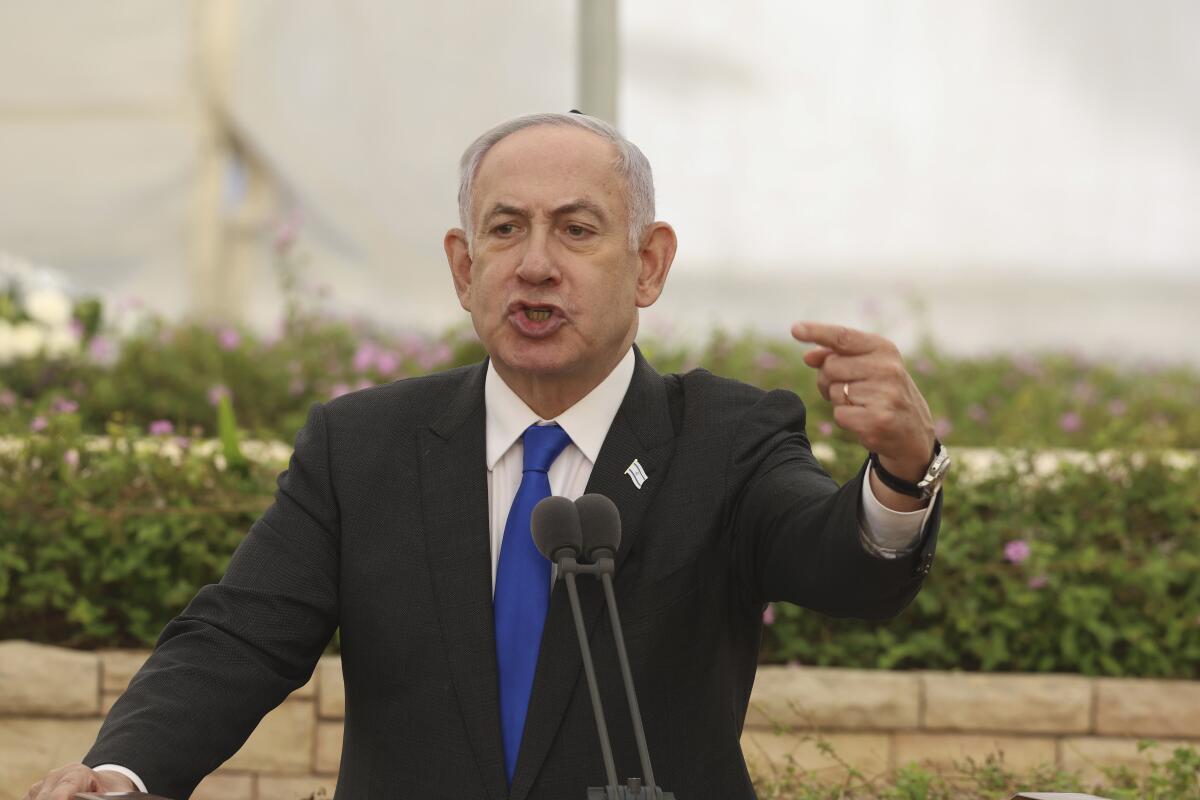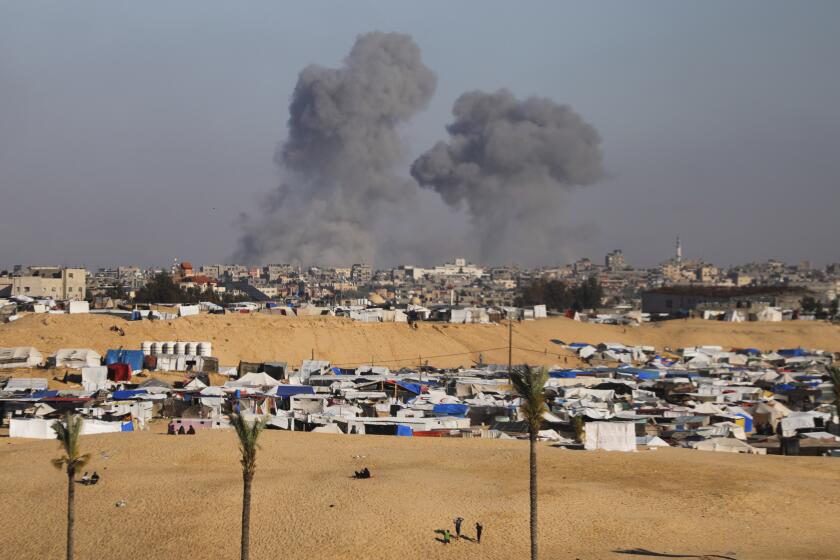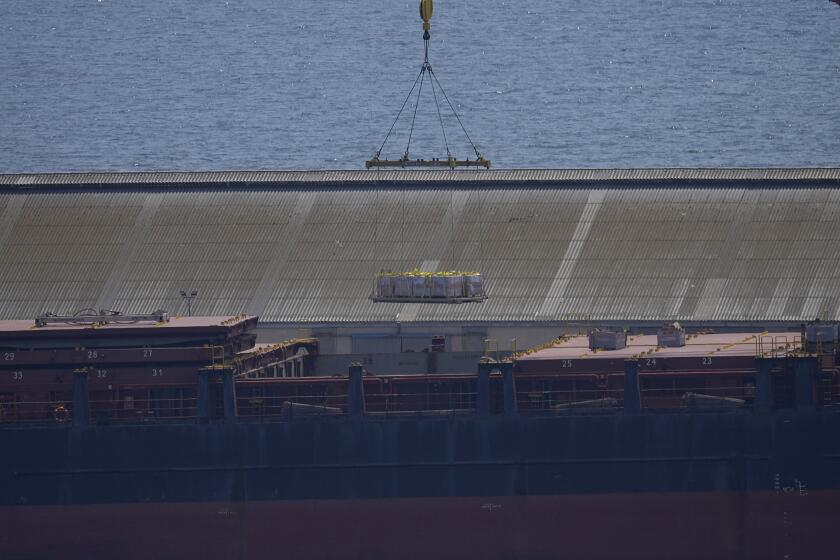Netanyahu claims U.S. is withholding weapons, blames Biden

- Share via
JERUSALEM — Israeli Prime Minister Benjamin Netanyahu on Tuesday claimed the United States is withholding weapons and implied that this was slowing the offensive in the southern Gaza city of Rafah, where fighting has exacerbated the dire humanitarian situation for Palestinians.
President Biden has delayed delivering certain heavy bombs since May over concerns about Israel’s killing of civilians in Gaza. Yet the administration has gone to lengths to avoid any suggestion that Israeli forces have crossed a red line in the deepening Rafah invasion, which would trigger a sweeping ban on arms transfers.
Netanyahu, in a video, spoke directly to the camera in English as he lobbed sharp criticism at Biden over “bottlenecks” in arms transfers.
A comparison of Biden and Trump on Mideast policy. The biggest disparity between the two candidates may be their attitude toward Palestinians.
“It’s inconceivable that in the past few months, the administration has been withholding weapons and ammunitions to Israel,” Netanyahu said. “Give us the tools, and we’ll finish the job a lot faster.”
Netanyahu also claimed that U.S. Secretary of State Antony J. Blinken, in a recent visit to Israel, said he was working around the clock to end the delays.
However, Blinken said Tuesday that the only pause was related to those heavy bombs from May.
“We, as you know, are continuing to review one shipment that President Biden has talked about with regard to 2,000-pound bombs because of our concerns about their use in a densely populated area like Rafah,” Blinken said during a State Department news conference. “That remains under review. But everything else is moving as it normally would.”
The Biden administration paused a shipment of bombs to Israel over concerns about a potential assault on the southern Gaza city of Rafah.
Netanyahu didn’t elaborate on what weapons were being held back, and the Israeli military declined to respond to a request for comment. Ophir Falk, a foreign policy advisor to Netanyahu, deferred questions on details to the U.S. government.
Responding to Netanyahu’s claim Tuesday, White House press secretary Karine Jean-Pierre said, “We generally do not know what he’s talking about. We just don’t.”
She added that the U.S. is having “constructive discussions” with Israel about the paused shipment of heavy bombs, and it is the only transfer being delayed.
Two top Democrats in Congress cleared the way this week for a $15-billion sale of F-15 aircraft to Israel, after a delay while one lawmaker sought answers from the Biden administration on Israel’s use of U.S. weapons in the war in the Gaza Strip.
With Israel’s war against Hamas in its ninth month, international criticism is growing over U.S. military and diplomatic support for the campaign of systematic destruction in Gaza, at a huge cost in civilian lives.
The Biden administration says Israel’s use of U.S. weapons in Gaza likely violated international law, but officials could not determine for certain.
The top United Nations court has concluded that there is a “plausible risk of genocide” in Gaza — a charge Israel strongly denies. Israel blames civilian deaths on Hamas, saying militants operate among the population.
Both Netanyahu and Biden are balancing their own domestic political problems against the explosive Mideast situation, and the embattled Israeli leader has grown increasingly resistant to the U.S. president’s public charm offensives and private pleading.
Experts say Netanyahu’s message is likely meant to shore up U.S. arms support and doesn’t appear to indicate on-the-ground shortages.
“I’m not worried,” said Itamar Yaar, a former deputy head of Israel’s National Security Council who leads a group of former senior security officials. He thinks Netanyahu wants “to make it difficult for the Biden administration to delay arms supply in the future.”
Netanyahu says a U.S. threat to withhold arms will not stop the war in Gaza, indicating Israel might proceed with an invasion of the packed city of Rafah.
Aviv Bushinsky, a former Netanyahu advisor, suggested that the prime minister’s office is working to set the agenda for Defense Minister Yoav Gallant’s meetings in the U.S. next week while allowing Netanyahu — rather than Gallant — to claim credit for releasing the shipment of bombs. The video also sets up a speech Netanyahu is to deliver to Congress in about a week, he said.
“It’s a very belligerent style of diplomacy, but he’s in a win-win situation,” Bushinsky said. “He has nothing to lose at the moment — this serves him in all dimensions, internally, publicly.”
Netanyahu on Monday disbanded his war Cabinet, a move that consolidates his influence over the war and likely diminishes the odds of a cease-fire anytime soon. Critics accuse him of delaying an end to the war because it would mean an investigation into the government’s failures on Oct. 7, the day of Hamas’ attack, and raise the likelihood of new elections when the prime minister’s popularity is low. Netanyahu denies the allegations and says he is committed to destroying Hamas’ military and governing capabilities — no matter how long that may take.
Biden tells Israel’s Netanyahu future U.S. support for war depends on new steps to protect civilians
President Biden has told Israeli Prime Minister Benjamin Netanyahu that future U.S. support for the Gaza war depends on new steps to protect civilians and aid workers.
Months of cease-fire talks have failed to find common ground between Hamas and Israel. Both have been reluctant to fully endorse a U.S.-backed plan that would return hostages, clear the way for an end to the war and begin rebuilding the Gaza Strip.
Israel’s war against Hamas has killed more than 37,100 people, according to Gaza’s Health Ministry, which does not distinguish between combatants and civilians in its count. The war has largely cut off the flow of food, medicine and other supplies to Palestinians who are facing widespread hunger.
Israel launched the war after Hamas’ Oct. 7 attack, in which militants stormed into southern Israel, killed some 1,200 — mostly civilians — and abducted about 250.
Frankel and Callister write for the Associated Press. Callister reported from New York. AP writer Matthew Lee contributed from Washington.
More to Read
Sign up for Essential California
The most important California stories and recommendations in your inbox every morning.
You may occasionally receive promotional content from the Los Angeles Times.















